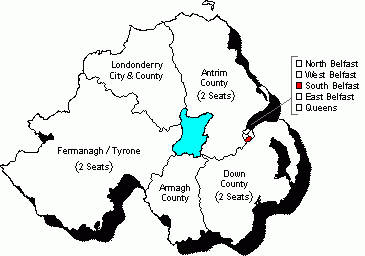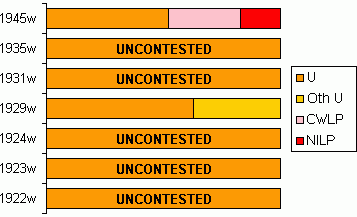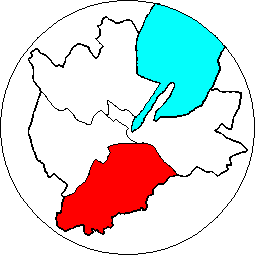

 |

|
| |
|
|
Friday April 4, 2025
|

|

|

|
| Map and diagram by Conal Kelly | ||
Incorporating the southern quarter of the city of Belfast, this constituency was established under the terms of the Government of Ireland Act 1920. The original South Belfast constituency had been eliminated as a result of the 1917 Redistribution of Seats (Ireland) Act. This new constituency replaced the short-lived Westminster seats of Cromac and Ormeau. Between 1922 and 1949 the constituency was represented by three different MPs, all of whom were Unionist. The longest serving of these was William Stewart, who was first elected in 1929 and continued to represent the constituency until his retirement in 1945. The general elections of 1922, 1923, 1924, 1931 and 1935 went uncontested. The declared winner in each case was the sole Unionist nominee.
See also election results for South Belfast 1950-1970, 1973-1982, 1983-1992 and 1993-2007.
| U | Ind U | CWLP | NILP | |
| 1945w | 52.2% | 30.29% | 17.5% | |
| 1935w | * | |||
| 1931w | * | |||
| 1929w | 62.9% | 37.1% | ||
| 1924w | * | |||
| 1923w | * | |||
| 1922w | * |
* The only candidate nominated for the 1922, 1923, and 1924 General Elections was Unionist Thomas Moles. The only candidate nominated for the 1931 and 1935 General Elections was Unionist William Stewart. In each instance the sole candidate was therefore duly elected without a contest.
Unionist majority: 10,186; electorate: 70,140; votes cast: 66.4%
Following the retirement of
Stewart, Lt-Col. Conolly Gage was selected by the Unionist Party to defend the South
Belfast seat. Conolly Gage would face opposition from the Commonwealth Labour Party
(CWLP) in the form of Harry Midgley and from the Northern Ireland Labour Party (NILP)
in the form of James Morrow. In the end Conolly Gage managed a comfortable victory
with over 52% of the vote and was returned as the new member of parliament for South
Belfast. Had the Labour vote not been split, it would have made for a much more
interesting contest.
Midgley had been elected to Belfast City Council in 1920. He stood unsuccessfully in
West Belfast for the 1923 and 1924 Westminster elections under the NILP banner. He was
elected in the 1933 Northern Ireland general election for Belfast Dock and again in a
1941 by-election for Belfast Willowfield. He founded the Commonwealth Labour Party in
1942 and would go on to serve as Minister of Public Security and Minister of Labour.
He eventually disbanded the CWLP and joined the Unionist Party in 1947.
This was Morrow's first electoral outing. He would go on to contest
North Belfast, in 1951,
taking 39.3% but failing to get elected. He would also make three unsuccessful
attempts to be elected to the Northern Ireland House of Commons for Belfast Duncairn
in 1945, 1949, and a by-election also in 1949.
Unopposed Unionist Candidate.
As was the case in 1931,
Stewart was the sole candidate nominated in South Belfast and was duly elected
without a contest once more. There were a total of seven seats that went
uncontested in the 1935 general election in Northern Ireland. The winner in each
case was the Unionist Party candidate.
This would be Stewart's last defense of his seat in South Belfast. Interestingly,
Stewart went on to found the Ulster Progressive Unionist Association in 1938.
The group fielded ten candidates in the 1938 Northern Ireland general election with
Stewart himself standing in Belfast Cromac. While none of the candidates were
successful, they did manage to capture 9.1% of the vote. Stewart would continue as
MP for South Belfast, taking the Unionist Party whip at Westminster, until his
retirement in 1945.
Unopposed Unionist Candidate.
Stewart was once again the Unionist Party candidate in 1931. However, this time he did not face an opponent and so was duly elected without a contest. South Belfast was one of nine seats that went uncontested in the 1931 general election in Northern Ireland. The sole nominee (and hence winner) in each instance was the Unionist candidate.
Unionist majority: 9,871; electorate: 59,025; votes cast: 64.7%
Despite having served
three terms as the MP for South Belfast, Moles retired never having faced
an opponent. However, South Belfast would get its first electoral contest in 1929.
The Unionists selected William Stewart to succeed Moles and his opponent would be
Independent Unionist Lt-Col. Philip Woods. Woods managed to attract 37% of the
vote but the result was a reasonably comfortable victory for Stewart with a
majority just under 10,000.
Stewart had stood unsuccessfully against his predecessor, Thomas Moles, when he
ran as an Independent Unionist in the 1918 election for Belfast Ormeau. Woods
was previously elected to the Northern Ireland House of Commons in a West
Belfast by-election in 1923. The election was caused by the assassination of
William Twaddell by the IRA. Woods stood for re-election in 1925 in two
constituencies: West Belfast and South Belfast. Successful in both, Woods
opted to sit for West Belfast West. He unsuccessfully contested the 1929 Northern
Ireland elections in Belfast St Anne's.
Unopposed Unionist Candidate.
In the third election in as many
years, Moles was once gain the sole candidate nominated in South Belfast and was once
again duly elected without a contest. South Belfast was one of only three seats that
went uncontested in the 1924 general election.
Moles became managing editor for the Belfast Telegraph newspaper in 1924. Moles would
later be re-elected to the Northern Ireland Parliament for the new single seat Belfast
Ballynafeigh constituency. He would hold this seat until his death in 1937.
Unopposed Unionist Candidate.
As was the case in 1922, Moles
was the sole candidate nominated in South Belfast and was duly elected without a contest
once more. South Belfast was one of nine seats that went uncontested in the 1923 general
election in Northern Ireland. The sole nominee (and hence winner) in each instance was
the Unionist candidate.
Moles was made a member of the Privy Council of Northern Ireland in 1923.
Unopposed Unionist Candidate.
This was the first election for
the newly established South Belfast constituency. The new constituency replaced the
Belfast Cromac and Belfast Ormeau constituencies that had been used in the 1918
election. Thomas Moles had been previously elected to represent Ormeau in 1918 and as
the sole nominee he was duly elected without a contest for South Belfast.
Moles had also been elected to the Northern Ireland House of Commons in 1921 as a member
for South Belfast (4 seats). There, he was appointed Chairman of the Ways and Means Committee
and was elected Deputy Speaker of the Northern Ireland House of Commons.
See also:
Results from 1922 to 1949 for each seat: East Belfast | North Belfast | South Belfast | West Belfast | Antrim | Armagh | Down | Fermanagh and Tyrone | Londonderry | Queens University
Other sites based at ARK: ORB (Online Research Bank) | CAIN (Conflict Archive on the INternet) | Northern Ireland Life and Times Survey
Your comments, please! Send an email to me at nicholas.whyte@gmail.com.
Conal Kelly, 10 October 2007.
|
|
Disclaimer:©
Nicholas Whyte 1998-2004 Last Updated on Wednesday, 12-Jan-2005 12:12
|